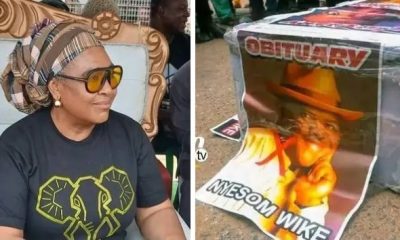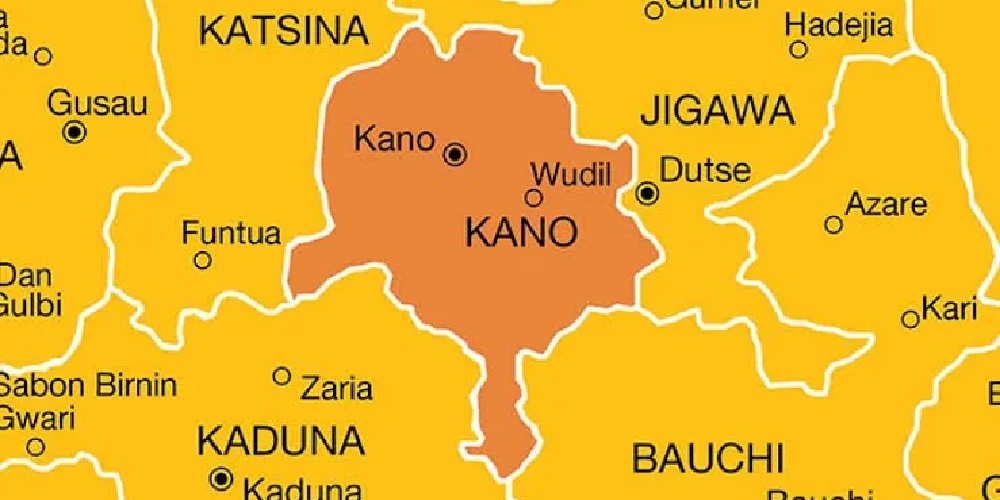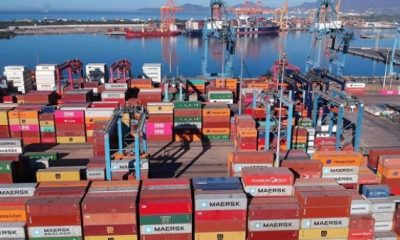News
Clarification: Nigerian Army Did Not Arrest Me’- Fisayo Soyombo

Nigerian investigative journalist, Fisayo Soyombo, has responded to claims by the Nigerian Army regarding his recent arrest, refuting their version of events.
Soyombo, the founder of the Foundation for Investigative Journalism (FIJ), was detained for three days by the Nigerian Army’s 6th Division in Port Harcourt, Rivers State, under suspicion of involvement in illegal oil bunkering.
The Army initially stated that Soyombo had been arrested alongside other individuals engaged in oil theft.
However, in an interview with Arise TV, Soyombo clarified that he was not arrested in connection with oil bunkering. He explained that he had approached the military personnel, assuming they were involved in facilitating a settlement between the oil thieves and the authorities. Soyombo admitted that he had not informed the Army about his undercover investigation due to his mistrust of public institutions, particularly the military.
“There was no arrest. The Nigerian Army did not arrest me. They spotted me, flashed their torch, and I came out to initiate a conversation. I didn’t show them my ID because the illegal bunkerers had mentioned that they had settled everyone, and the soldiers I saw were those who hadn’t been settled. I thought it was a conversation about settling them, so I approached,” Soyombo explained.
He further admitted that he didn’t trust the Nigerian Army, particularly due to the widespread bribery and corruption involving illegal oil bunkerers and various security agencies. Soyombo expressed concern about his safety if he had disclosed his identity to the Army, stating, “I didn’t trust the Army, and I didn’t bring them into the investigation because known illegal oil bunkerers were bribing different security formations, and I feared for my life if I didn’t know who I was dealing with.”
Soyombo revealed that while detained at the military camp, he maintained his cover as an illegal oil bunkerer until he was eventually taken to the 6th Division headquarters. It was only then, when speaking with officials who were investigating the case, that he revealed he was an undercover journalist and provided evidence of his identity.
The incident drew attention to the ongoing challenges of conducting investigative work in Nigeria, particularly when dealing with sensitive issues such as corruption and illegal activities within the security forces. Soyombo’s clarification highlights the complexity and risks involved in undercover journalism in the country.
News
Police ‘rescue’ landlord, daughter from k!dnappers clutches in Lagos

By Kayode Sanni-Arewa
Suspected gunmen abducted a landlord and his daughter in the Ijede area of Ikorodu in Lagos.
In a statement on Sunday, Benjamin Hundeyin, the Lagos police spokesperson, said the kidnappers abducted the victims on Wednesday.
Hundeyin added that on Saturday, the command rescued the kidnapped victims unhurt and handed them over to their family members.
According to the police spokesperson, the command has launched a manhunt for the perpetrators.
“The police received information that some kidnappers invaded Ijede community and kidnapped two persons,” the statement reads.
“Upon receipt of the report, police operatives were mobilised to the scene where it was observed that the kidnappers forcefully gained entrance into the house of a 40-year-old man, killed the security dog and kidnapped him.
“The kidnappers equally forced their way into the nearby house and kidnapped the landlord’s 25-year-old daughter.
“With the collaborative efforts of both the police joint task force and other stakeholders, the kidnapped victims were rescued unhurt and handed over to their family members.
“The area is relatively calm and being closely monitored, and efforts are ongoing to apprehend the wanted suspects.”
News
Just in: Tinubu extends immigration CG Nandap’s tenure till 2026

By Kayode Sanni-Arewa
President Bola Tinubu has approved the extension of the tenure of the Comptroller-General of the Nigeria Immigration Service, Kemi Nandap, until December 31, 2026.
Nandap, who joined the NIS on October 9, 1989, was appointed as Comptroller-General on March 1, 2024, with an initial tenure set to end on August 31, 2025.
A statement by the president’s Special Adviser on Information and Strategy, Bayo Onanuga, on Monday, said Tinubu commended Nandap for her leadership, noting improvements in border management, immigration modernisation, and national security under her watch.
“Under her leadership, the Nigeria Immigration Service has witnessed significant advancements in its core mandate, with notable improvements in border management, modernisation of immigration processes and national security measures.
“President Tinubu commended the Comptroller-General for her exemplary leadership and urged her to continue dedicating herself to the Service’s strategic priorities, which align with his administration’s Renewed Hope Agenda,” the statement read.
He also reaffirmed his commitment to supporting the NIS in safeguarding Nigeria’s borders and ensuring safe and legal migration.
News
Sad! Popular actor, Richard Chamberlain is dead

Tragedy strikes the entertainment world as American actor and singer, Richard Chamberlain, passes away, leaving an Irreparable void.
According to reports, the renowned actor passed away prior to his 91st birthday, following complications from a stroke.
His passing has sparked an outpouring of condolences from fans and industry colleagues alike, as they mourn the loss of a beloved talent and celebrate his enduring legacy.
Moreover, tributes have flooded social media, with many remembering Chamberlain’s iconic roles in ‘Dr. Kildare,’ ‘Shōgun,’ and ‘The Thorn Birds.
His contributions to the entertainment industry and his lasting impact on audiences worldwide are being widely acknowledged.
-

 News9 hours ago
News9 hours agoWike’s Aide reacts as photo appears online, points accusation finger at paid failed actress
-

 News15 hours ago
News15 hours agoUpdated: WATCH moment Gov Diri’s Tech Adviser Kerry admits blowing up pipelines (Video)
-

 News5 hours ago
News5 hours agoFormer HoR member, TeeJay Yusuf calls on IGP, Kogi govt, other agencies to curb rising insecurity in Okun-Yoruba
-

 News6 hours ago
News6 hours agoEdo Killings: Kano Govt Sends Fact-Finding Delegation, Demands Justice
-

 News23 hours ago
News23 hours agoWATCH Gov Diri’s Tech Adviser, Kerry admits blowing up pipelines
-

 News6 hours ago
News6 hours agoJust in: Popular Osun Monarch Joins Ancestors
-

 News3 hours ago
News3 hours agoMali, Niger, Burkina Faso Impose 0.5% Levy On Goods From ECOWAS Nations
-

 News11 hours ago
News11 hours agoN24bn monthly salaries drive Oyo’s economic stability – Makinde assures


















